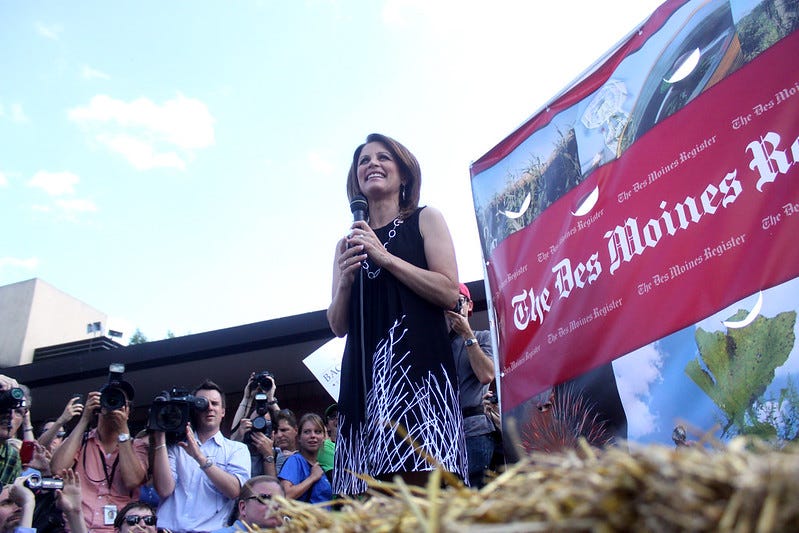Three Weird Things about the Republican Nomination Contest
Republicans are adapting to a changing or diminished role for Fox News, CPAC, and Twitter
In some ways, the Republican presidential nomination cycle is daring to look… almost normal? You have a number of senators, governors, former vice presidents, and other prominent individuals raising money, gathering endorsements, speaking in Iowa and New Hampshire, and doing all the things that would normally happen around now.
In other ways, this is going to be a strange cycle. Yes, to be sure, it’s weird to have one of the candidates be a former president, no less one who was doubly impeached and has an unusual stranglehold on the party’s most enthusiastic voters. And Democrats have blown up their traditional nomination calendar, although, at least for now, Republicans are sticking with the Iowa-first ritual.
But three particular things that we have taken for granted in recent nomination cycles are now experiencing a different and diminished role, adding to the uncertainty of just what the informal rules are in this very complicated process.
Fox News
The personalities on Fox News have been playing an important role in disseminating conservative talking points since the 1990s. But in more recent election cycles, the network has functioned something like a wing of the Republican Party, active in helping the party select its nominees. We saw some of this in 2015, when Fox debate hosts provided the criticism of Trump that his rival candidates would not, seeking to protect the party from him, and later pivoted to defending him as he clinched the nomination. We saw it in 2018, when Ron DeSantis secured Florida’s Republican gubernatorial nomination by winning the “Fox primary,” appearing on the network frequently to enhance his name recognition and stature. In research I did with Rachel Blum, we found that each additional appearance on Fox News a candidate in the 2022 primaries had was associated with roughly an additional half point in the primary election.
This is changing now in the wake of Dominion Voting Systems’ $1.6 billion lawsuit against Fox. As revelations from that case demonstrate quite baldly, Fox News personalities blatantly lied in the wake of the 2020 election, augmenting Trump’s baseless claims of election fraud and promoting theories and personalities they knew to be fallacious. Will conservative viewers turn against them for this? Probably not many.
But between accusations that the network was too quick to call the 2020 election for Biden and then too eager to throw reality under the bus for Trump, surely its reputation and trustworthiness have been sullied somewhat among all but the most enthusiastic Trump backers in the party. What’s more, if this lawsuit is successful — which is a long shot but man oh man the evidence — it’s almost certain to lead to some changes in Fox behavior. More distance from Trump? A loss of audience to Newsmax and other more conservative outlets? Whatever happens, its role in the invisible primary is likely to be diminished.
CPAC
The Conservative Political Action Conference — a longstanding gathering for sharing ideas, boosting conservative causes, and testing presidential candidates, has become, in the words of Ben Jacobs, “a janky half empty Trump convention”:
The 2023 CPAC felt like a mall after all but one of its big department stores has shut down — an emptier, jankier, lower-rent version of conferences past. The rooms were more deserted, the vendors more downmarket, and speakers a little less important.
This was due to a number of factors, including the rise of rival conferences and sexual misconduct allegations against the leader of CPAC. But the result is that the attention the candidates get from attending CPAC and their performance in the organization’s straw poll just doesn’t matter much this year. It’s just Trump and a handful of fringe candidates speaking. To the extent this event helped winnow the field or just connect candidates with some enthusiastic backers in the past, it’s just not happening in this cycle.
It’s no secret that Twitter has gotten a lot worse under Elon Musk’s leadership. Some, no doubt, appreciate some of the changes — some conservative voices banned from the site since January 6th have been reinstated. But for the most part, it’s just harder to use it for the thing it was best at — putting people in touch with each other who might not otherwise meet.
That research with Rachel Blum I reference above found a relationship between candidates’ share of Twitter chatter and their vote share in Republican primaries last year. It’s not necessarily determinative, but Twitter has been a means through which party activists and primary voters learn about candidates and organize to help them. That role is almost certainly diminished today.
On top of that, Twitter was pretty clearly an important part of Trump’s rise and his communication with supporters and the media during his presidency. He’s been off that site for over two years now. It appears he could return if he wanted to, but he might be more interested in sticking with his Truth Social site, which largely means he’s only communicating with voters already loyal to him. That could be enough for his needs, but he’s just pretty clearly playing in a different sandbox than everyone else.
All this is to say that there’s a good deal more uncertainty about just how to go about winning a Republican presidential nomination than there was in other recent cycles. This may just encourage candidates to rely on the classics — state fairs, wooing newspaper endorsements, etc. But in general, it’s just harder to know what’s going to happen, and harder for candidates to figure out what they need to do.





